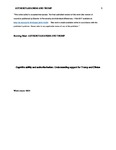Cognitive ability and authoritarianism: Understanding support for Trump and Clinton
| dc.contributor.author | Choma, BL | |
| dc.contributor.author | Hanoch, Y | |
| dc.date.accessioned | 2017-02-10T14:44:39Z | |
| dc.date.issued | 2017-02-01 | |
| dc.identifier.issn | 0191-8869 | |
| dc.identifier.other | C | |
| dc.identifier.uri | http://hdl.handle.net/10026.1/8451 | |
| dc.description | publisher: Elsevier articletitle: Cognitive ability and authoritarianism: Understanding support for Trump and Clinton journaltitle: Personality and Individual Differences articlelink: http://dx.doi.org/10.1016/j.paid.2016.10.054 content_type: article copyright: © 2016 Elsevier Ltd. All rights reserved. | |
| dc.description.abstract |
With Donald Trump the Republican nominee and Hillary Clinton the Democratic nominee for the 2016 U.S. Presidential election, speculations of why Trump resonates with many Americans are widespread - as are suppositions of whether, independent of party identification, people might vote for Hillary Clinton. The present study, using a sample of American adults (n = 406), investigated whether two ideological beliefs, namely, right-wing authoritarianism (RWA) and social dominance orientation (SDO) uniquely predicted Trump support and voting intentions for Clinton. Cognitive ability as a predictor of RWA and SDO was also tested. Path analyses, controlling for political party identification, revealed that higher RWA and SDO uniquely predicted more favorable attitudes of Trump, greater intentions to vote for Trump, and lower intentions to vote for Clinton. Lower cognitive ability predicted greater RWA and SDO and indirectly predicted more favorable Trump attitudes, greater intentions to vote for Trump and lower intentions to vote for Clinton. | |
| dc.format.extent | 287-291 | |
| dc.language | en | |
| dc.language.iso | en | |
| dc.publisher | Elsevier BV | |
| dc.subject | Authoritarianism | |
| dc.subject | Ideological beliefs | |
| dc.subject | Right-wing authoritarianism | |
| dc.subject | Social dominance orientation | |
| dc.subject | Cognitive ability | |
| dc.subject | Voting | |
| dc.subject | Political psychology | |
| dc.title | Cognitive ability and authoritarianism: Understanding support for Trump and Clinton | |
| dc.type | journal-article | |
| dc.type | Article | |
| plymouth.volume | 106 | |
| plymouth.publication-status | Accepted | |
| plymouth.journal | Personality and Individual Differences | |
| dc.identifier.doi | 10.1016/j.paid.2016.10.054 | |
| plymouth.organisational-group | /Plymouth | |
| plymouth.organisational-group | /Plymouth/REF 2021 Researchers by UoA | |
| plymouth.organisational-group | /Plymouth/REF 2021 Researchers by UoA/UoA04 Psychology, Psychiatry and Neuroscience | |
| plymouth.organisational-group | /Plymouth/Research Groups | |
| plymouth.organisational-group | /Plymouth/Research Groups/Centre for Brain, Cognition and Behaviour (CBCB) | |
| plymouth.organisational-group | /Plymouth/Research Groups/Centre for Brain, Cognition and Behaviour (CBCB)/Behaviour | |
| dcterms.dateAccepted | 2016-10-27 | |
| dc.rights.embargodate | 2018-11-3 | |
| dc.rights.embargoperiod | 24 months | |
| rioxxterms.versionofrecord | 10.1016/j.paid.2016.10.054 | |
| rioxxterms.licenseref.uri | http://www.rioxx.net/licenses/under-embargo-all-rights-reserved | |
| rioxxterms.licenseref.startdate | 2017-02-01 | |
| rioxxterms.type | Journal Article/Review |


